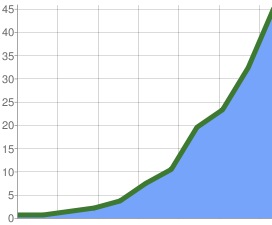Five words for 'improve' in Mandarin
提高 · 改进 · 改善 · 改良 · 进步
 There are quite a few different words in Mandarin that are often translated as ‘improve’ in English. Here’s a guide to five of the most common ones, and the differences between them.
There are quite a few different words in Mandarin that are often translated as ‘improve’ in English. Here’s a guide to five of the most common ones, and the differences between them.
- 提高 (tígāo)
- 改进 (gǎijìn)
- 改善 (gǎishàn)
- 改良 (gǎiliáng)
- 进步 (jìnbù)
提高: to increase
提高 is literally ‘raise high’, and expresses improving something by taking it to a higher level. It’s often used with rates, quantities and measurements etc.
Common collocations for 提高:
-
- *水平 (shuǐpíng) : level
- 率 (lǜ) : rate
Example sentences:
为了提高我的汉语水平,我想去中国学习。 Wèile tígāo wǒ de hànyǔ shuǐpíng, wǒ xiǎng qù zhōngguó xuéxí. “I’d like to study in China to improve the level of my Chinese.”
我们罢工之所以是因为公司没有提高我们的工资。 Wǒmen bàgōng zhī suǒyǐ shì yīnwèi gōngsī méiyǒu tígāo wǒmen de gōngzī. “The reason we’re on strike is that the company hasn’t improved our wages.”
这个药品会提高病人的存活率。 Zhège yàopǐn huì tígāo bìngrén de cúnhuó lǜ. “This drug will improve the survival rates of patients.”
改进: to make progress (with something)
改进 is improve in the direct, obvious sense of making something better. 改 means ‘to change’, and 进 means ‘to advance’ or ‘to make progress’. It’s about improving the quality or fitness of something.
Common collocations for 改进:
- 做法 (zuòfǎ) : method
- 态度 (tàidu) : attitude
- 行为 (xíngwéi) : behaviour
Example sentences:
要是你想批评别人的话,首先需要改进自己的做法。 Yàoshi nǐ xiǎng pīpíng biérén dehuà, shǒuxiān xūyào gǎijìn zìjǐ de zuòfǎ. “If you want to criticise other people, first you must improve your own methods.”
我希望改进自己的工作态度。 Wǒ xīwàng gǎijìn zìjǐ de gōngzuò tàidù. “I hope to improve my attitude to work.”
为了改进学生的学习态度,学校让他们晚一个小时来上课。 Wèile gǎijìn xuéshēng de xuéxí tàidù, xuéxiào ràng tāmen wǎn yīgè xiǎoshí lái shàngkè. “In order to improve the students’ attitude to their studies, the school let them start class an hour later.”
改善: to make something good
改善 is similar to 改进, except it implies more strongly that the thing to be improved is currently lacking or deficient in some way. Again, 改 is ‘to change’, and 善 is ‘good’, so 改善 is literally ‘to change something and make it good’.
Common collocations for 改善:
- 环境 (huánjìng) : environment
- 情况 (qíngkuàng) : situation
- 关系 (guānxì) : relations
- 问题 (wèntí) : problem
Example sentences:
这个政策的目标是改善最贫困的市场的环境。 Zhège zhèngcè de mùbiāo shì gǎishàn zuì pínkùn de shìchǎng de huánjìng. “The aim of this policy is to improve the environment in the poorest cities.”
他认为太极拳改善了他的生活。 Tā rènwéi tàijí quán gǎishàn le tā de shēnghuó. “He believes that Tai Ji has improved his life.”
英国必须改善自己的火车网状系统问题。 Yīngguó bìxū gǎishàn zìjǐ de huǒchē wǎng zhuàng xìtǒng wèntí. “The UK must improve the problems with its rail network.”
改良: to reform
改良 is similar to 改善, but is rarer and more formal (an equivalent in English might be ‘to ameliorate’). Like 善, 良 means ‘good’, so 改良 could also be seen as ‘to change something and make it good’. 改良 is part of the word 改良主义 - ‘reformism’, as opposed to favouring a rapid revolution.
Common collocations for 改良:
- 结构 (jiégòu) : structure
- 技术 (jìshù) : technique
- 土地 (tǔdì) : territory
- 工业 (gōngyè) : industry
Example sentences:
经理打算改良公司的结构。 Jīnglǐ dǎsuàn gǎiliáng gōngsī de jiégòu. “The manager wants to improve the company’s structuring.”
通过遗传修饰,我们可以改良农作物。 Tōngguò yíchuán xiūshì, wǒmen kěyǐ gǎiliáng nóngzuòwù. “Through genetic modification, we can improve crops.”
这个新的市场可能改良全部的工业。 Zhège xīn de shìchǎng kěnéng gǎiliáng quánbù de gōngyè. “This new market may improve the entire industry.”
进步: progress
进步 is commonly a noun, meaning ‘improvement’ or ‘progress’. 进 also appears in 改进, above, and means ‘progress’, whilst 步 is ‘step’ or ‘stage’. 进步 can also be a verb, but doesn’t take an object.
Example sentences:
今天我们取得了很多进步。 Jīntiān wǒmen qǔdé le hěnduō jìnbù. “We’ve made a lot of improvements today.”
不知道要等多长时间,我的创作能力才能进步。 Bù zhīdào yào děng duō cháng shíjiān, wǒ de chuàngzuò nénglì cái néng jìnbù. “I don’t know how long I’ll have to wait before my creative ability improves.”
